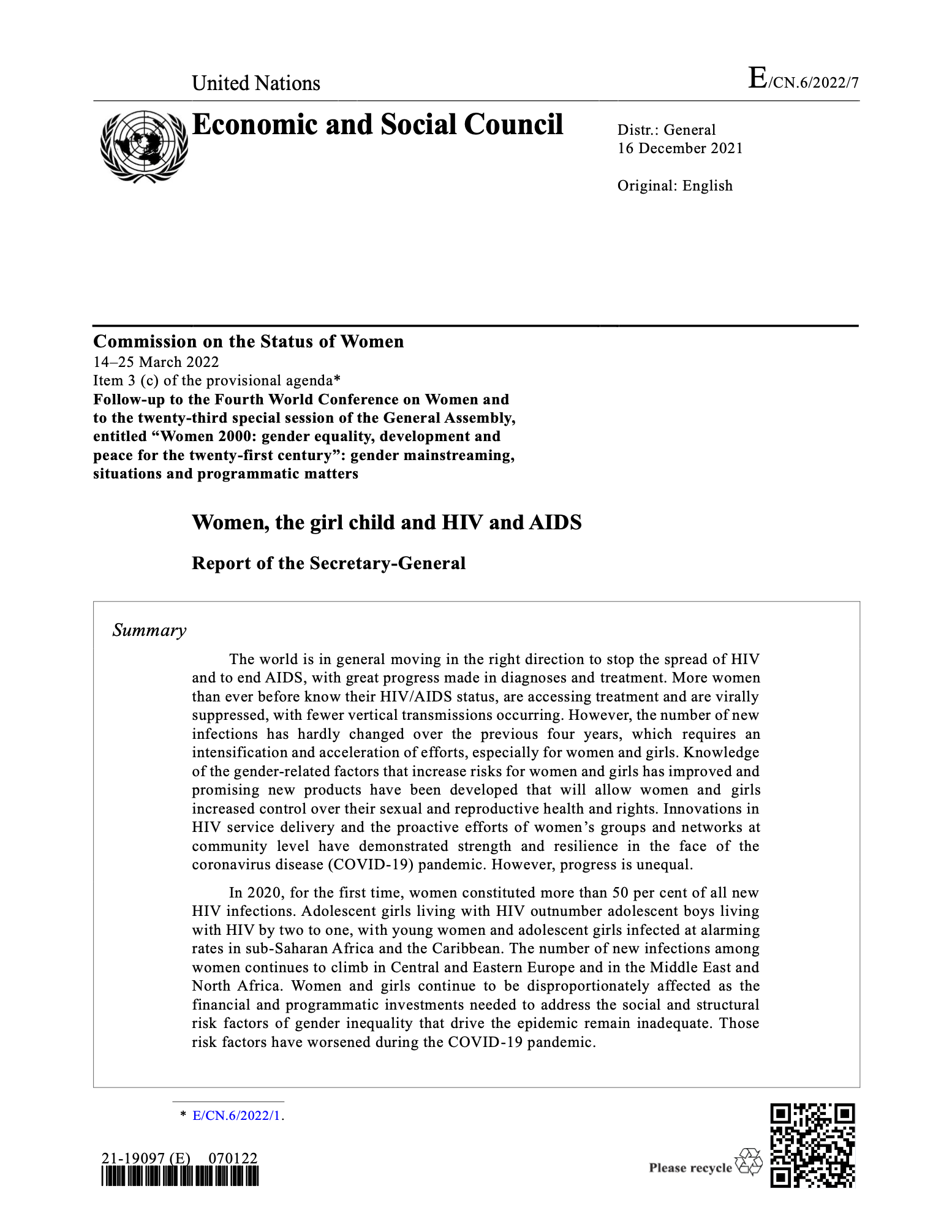2021 CSW Report on women and HIV/AIDS
Analysis of precedential value
The Commission on the Status of Women (CSW) is a functional commission of the Economic and Social Council (ECOSOC). It is the most important global intergovernmental body exclusively dedicated to the promotion of gender equality and the empowerment of women. Although its declarations are non-binding, it plays an instrumental role in shaping global standards on gender equality, that is, women’s enjoyment of their rights in political, economic, and social fields.
Used as precedent
gender equality, gender norms and stereotypes
“The unequal status of women and girls across political, social, economic and cultural domains continue to put women at greater risk of HIV infection and affects access to and uptake of HIV services. Factors that increase the risk of HIV infection, such as poverty, food insecurity, gender-based violence, stigma and discrimination, child and forced age-disparate marriage, low educational completion rates and limited access to quality unbiased information, disproportionately affect women and girls. These factors have been exacerbated by the COVID-19 pandemic. Social norms and controlling behaviours by men still prevent many women and adolescent girls from using contraception, refusing unwanted sex and making their own decisions about their health care.” (paragraph 6)
key population and community leadership
“The meaningful participation and engagement of women, including women living with HIV and young women, in the development, implementation and monitoring of national HIV strategies, policies and programmes is essential for ensuring that national HIV responses meet their needs.” (paragraph 12)
“The Commission may wish to encourage Member States to increase international and domestic financing to reach the goal of $29 billion in annual investment by 2025 to meet the needs of low- and middle-income countries in the HIV and AIDS response, with greater allocations for women-led organizations, for prevention and for societal enablers that promote human rights and gender equality.” (paragraph 57(f))
“The Commission may wish to encourage the United Nations system and other international actors to facilitate the active engagement, representation and decision-making of women living with, at risk of or affected by HIV and their networks in international, regional, national and community-led processes related to the HIV and AIDS response.” (paragraph 58(d))
bodily autonomy and integrity, gender equality
“Stigma (including in health-care settings), gender inequalities, intimate partner violence, poverty and discriminatory laws and practices continue to limit access and the ability or willingness of women, and especially adolescent girls, to test, seek treatment or remain engaged in care. As of 2020, 108 countries reporting to the UNAIDS National Commitments and Policy Instrument required parental or guardian consent for HIV tests for adolescents and 48 required such consent for HIV treatment.” (paragraph 22)
comprehensive sexuality education
“Age-appropriate, comprehensive sexuality education for adolescents both in and out of school is a proven strategy, contributing to reductions in gender-based violence, increased use of contraception, decreased numbers of sexual partners and delayed initiation of sexual intercourse.” (paragraph 29)
negative legal determinants
“The HIV response for women and girls is negatively affected by laws that do not adequately address violence and harmful practices directed against women; perpetuate gender inequality and discrimination; restrict the access of women and adolescent girls to sexual and reproductive health and rights; and criminalize HIV non-disclosure, exposure and transmission.” (paragraph 36)
stigma and discrimination
“More than a quarter of people aged 15 to 49 years in 52 out of 58 countries with population-based survey data hold discriminatory attitudes towards people living with HIV, and, in 36 countries, more than half held such views. Discrimination in health-care settings can deter access to testing and treatment.” (paragraph 39)
gender equality, key population and community leadership
“The Commission may wish to encourage Member States to give meaningful support to the voices, participation and decision-making of women, particularly young women and adolescent girls, in all their diversity, including women living with HIV and women in key populations, as integral partners in national HIV coordinating bodies, national dialogue and community-led processes, including by strengthening the capacities of their organizations and by ensuring formal participation in the design, delivery and monitoring of all strategies, programmes and interventions that affect them.” (paragraph 57(b))
gender equality, negative legal determinants
“The Commission may wish to encourage Member States to reform laws that directly or indirectly discriminate against women and girls, including those affecting women living with and affected by HIV and women in key populations, and to adopt appropriate legislative, administrative, budgetary, judicial and other measures to ensure the full realization of women’s sexual and reproductive health and rights.” (paragraph 57(c))
gender equality
“The Commission may wish to encourage the United Nations system and other international actors to scale up funding and technical resources for evidence-based interventions that address the gender-based structural, social and economic inequalities that fuel the HIV epidemic.” (paragraph 58(a))
access to health products
“The Commission may wish to encourage the United Nations system and other international actors to advocate for the removal of obstacles that limit the capacity of low-and middle-income countries to provide affordable and effective HIV prevention and treatment products, diagnostics, commodities and other pharmaceutical products tailored to or that are more appropriate for women and to support access to safe, effective, quality and affordable medicines, including generics, to ensure that they reach the people who need them the most, especially adolescent girls and young women.” (paragraph 58(e))
